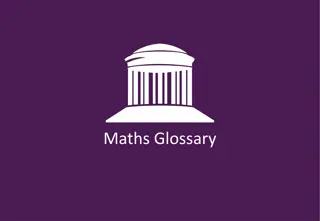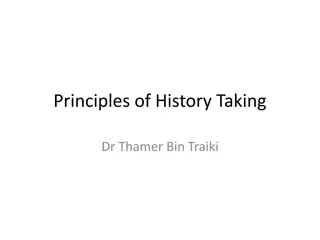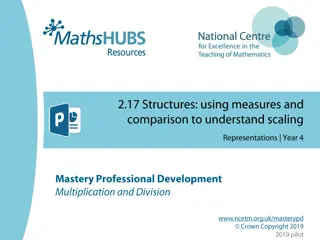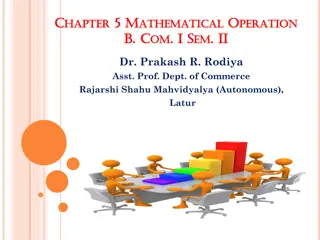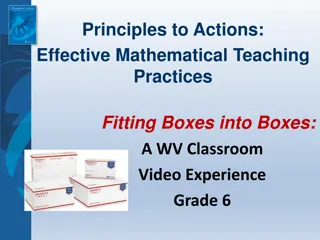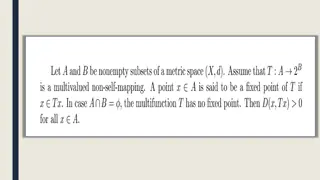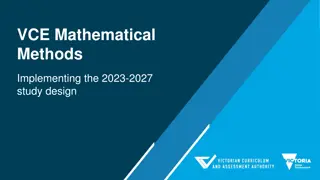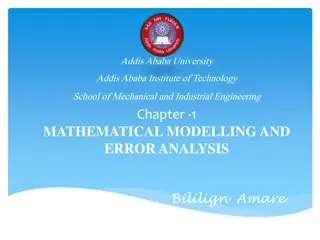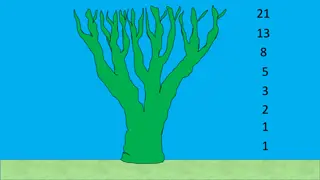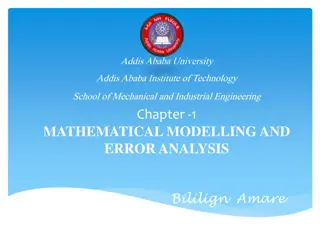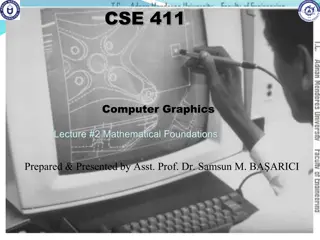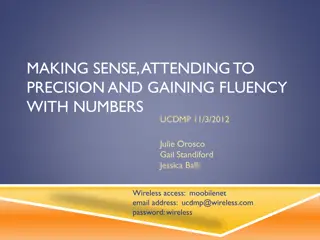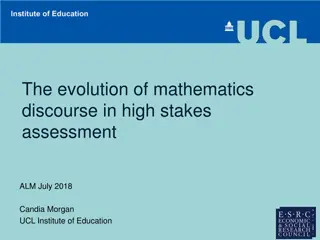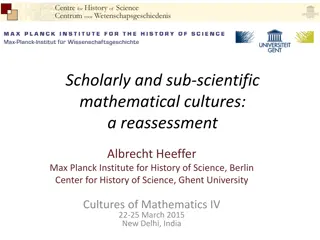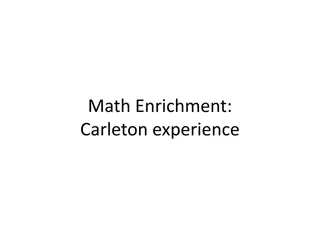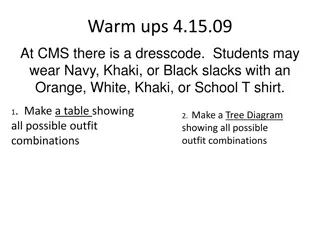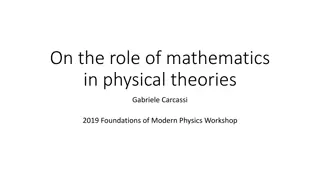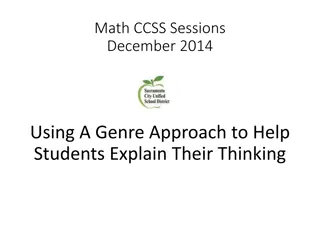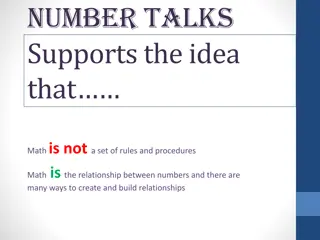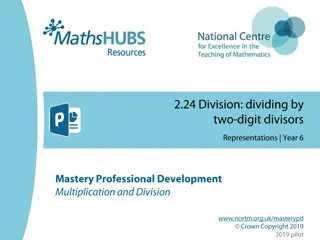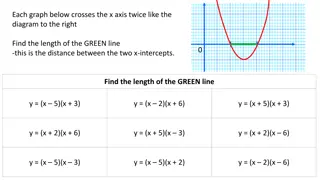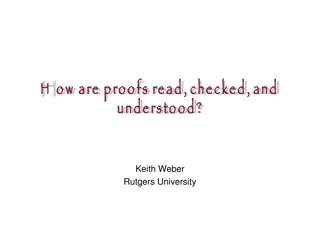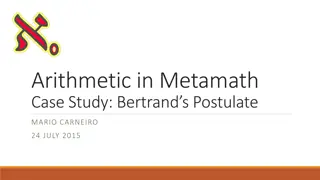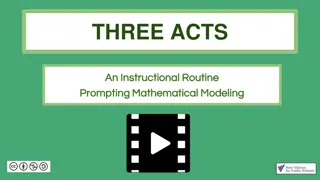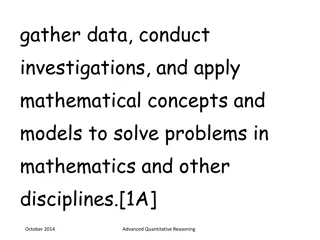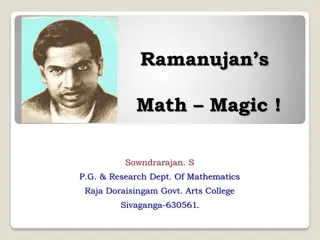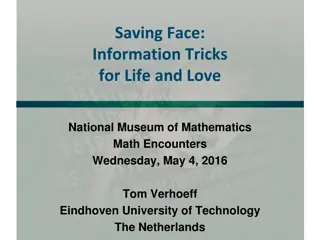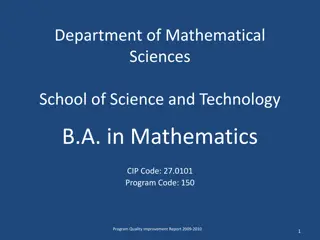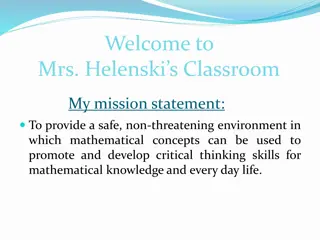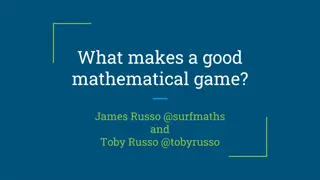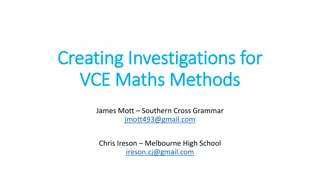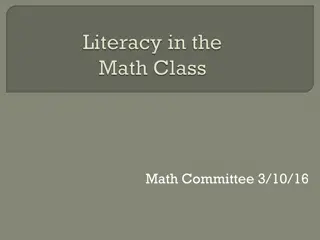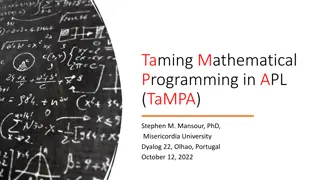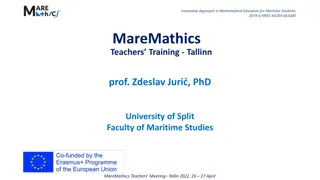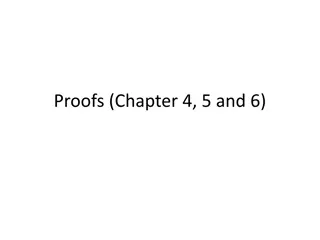Mathematical Checkpoints and Equations Activities for Year 7 Students
Engage Year 7 students in a series of 16 checkpoint activities and 12 additional activities focused on expressions, equations, and mathematical concepts. Explore topics like checks and balances, shape balance, equations from bar models, number line concepts, and more to enhance mathematical understa
3 views • 42 slides
Effective Strategies for Teaching Mathematics: Concrete, Pictorial, Abstract Approach
Utilizing concrete manipulatives, pictorial representations, and abstract symbols is a crucial method for enhancing mathematical understanding. This approach guides students from hands-on exploration to visual representation and ultimately to solving problems with symbols. By engaging in this progre
1 views • 25 slides
Evolution of Mathematical Theories and Proof Systems
Development of mathematical theories such as model theory, proof theory, set theory, recursion theory, and computational complexity is discussed, starting from historical perspectives with Dedekind and Peano to Godel's theorems, recursion theory's golden age in the 1930s, and advancements in proof t
2 views • 29 slides
Principles of History Taking in Clinical Assessment
History taking is a crucial process in patient assessment, aiding in determining the etiology of medical issues. Obtaining an accurate history through proper questioning, active listening, and maintaining a professional appearance is vital for making accurate diagnoses. The history should follow a s
1 views • 35 slides
Mathematical Relationships and Measurements Illustrated with Images
Explore various mathematical concepts such as measurements, proportions, and equations depicted through a series of images. From calculating ribbon lengths to understanding weight conversions, this visual journey provides a unique perspective on mathematical problem-solving and applications.
0 views • 22 slides
Mastering Symbol Substitution in Mathematical Operations
In the realm of mathematical operations, understanding symbol substitution is key to solving questions efficiently. Learn how to interchange mathematical signs and symbols to find the correct answer. With examples and guidance, grasp the concept of symbol substitution and excel in tackling such ques
0 views • 25 slides
Enhancing Mathematical Teaching Practices for Student Success
Explore the evolution of standards-based mathematics education reform through a 25-year journey, emphasizing the crucial role of effective teaching in ensuring mathematical success for all students. Discover the challenges faced in improving math education and the principles that guide meaningful le
0 views • 64 slides
Mathematical Definitions and Theorems Illustrated
In this collection of images, various mathematical concepts are visually presented, including definitions, theorems, and proofs. The slides cover a range of topics in a structured manner, providing a concise overview of key mathematical principles. From foundational definitions to detailed proofs, t
0 views • 12 slides
Implementing the VCE Mathematical Methods 2023-2027 Study Design
The VCE Mathematical Methods study design for 2023-2027 includes a detailed outline of the curriculum, revisions in Units 1-4, investigations leading to assessments, and FAQs. The study design was the result of thorough consultation and review, published in February 2022 and accredited by VRQA. It f
5 views • 31 slides
Mathematical Modeling and Error Analysis in Engineering
Mathematical modeling plays a crucial role in solving engineering problems efficiently. Numerical methods are powerful tools essential for problem-solving and learning. This chapter explores the importance of studying numerical methods, the concept of mathematical modeling, and the evaluation proces
0 views • 10 slides
Various Branches of History Explored
Explore different branches of history such as Political History, Constitutional History, Parliamentary History, Legal History, Military History, Diplomatic History, and Social History. Each branch delves into specific aspects of the past, shedding light on politics, governance, warfare, diplomacy, a
1 views • 18 slides
Fibonacci Sequence, Bee Hives, and Squares in Nature
Discover the fascinating world of Fibonacci sequence through the lens of bees, sunflowers, and mathematical patterns in nature. Learn about the Fibonacci numbers, bee colonies, the beauty of sunflowers, and the mathematical properties of squares. Dive into the history of Leonardo of Pisa and his con
0 views • 16 slides
Mathematical Modeling and Error Analysis in Engineering
Mathematical modeling plays a crucial role in problem-solving in engineering by using numerical methods. This involves formulating problems for solutions through arithmetic operations. The study of numerical methods is essential as they are powerful problem-solving tools that enhance computer usage
5 views • 10 slides
Mathematical Foundations for Computer Graphics: Geometry, Trigonometry, and Equations
This lecture covers essential mathematical tools for computer graphics, including 2D and 3D geometry, trigonometry, vector spaces, points, vectors, coordinates, linear transforms, matrices, complex numbers, and slope-intercept line equations. The content delves into concepts like angles, trigonometr
1 views • 53 slides
Simplifying Residency Shift Scheduling with Mathematical Programming Techniques
This project, led by Professor Amy Cohn and William Pozehl, aims to demonstrate how mathematical programming techniques can simplify the complex task of residency shift scheduling. The Residency Shift Scheduling Game highlights the challenges of manual scheduling and the ease of using mathematical p
1 views • 37 slides
Mathematical Practices and Problem-Solving Approaches
Explore the importance of mathematical practices and problem-solving strategies in gaining fluency with numbers. Discover resources such as King Arthur's Round Table activity and Common Core State Standards for Mathematics to enhance reasoning, precision, and mathematical modeling skills.
0 views • 35 slides
Evolution of Mathematics Discourse in High Stakes Assessment
This study explores changes in school mathematics discourse over the past three decades in England through high stakes GCSE examinations. It analyzes the impact of these changes on classroom practices and student mathematical engagement, emphasizing the role of language in shaping mathematical exper
0 views • 50 slides
Reassessing Scholarly and Sub-Scientific Mathematical Cultures
Scholarly and sub-scientific mathematical cultures are reevaluated through the works of Jens Hoyrup, focusing on the organized nature of sub-scientific knowledge. The distinction between theoretical and practical knowledge, applications to mathematical cultures, and misconceptions related to the sup
0 views • 53 slides
Math Enrichment Programs at Carleton: Inspiring Excellence in Mathematics
Explore the diverse math enrichment programs offered at Carleton Math Enrichment Centre, ranging from Math Kangaroo Adventures to Competitive Math training. With a rich curriculum tailored for various age groups, these programs aim to nurture mathematical skills and foster a passion for problem-solv
0 views • 13 slides
Fashion Dress Code Combinations and Mathematical Tables
Explore the dress code combinations for a school and delve into mathematical tables related to the area, circumference of a circle, and the volume of a cube. The content includes creating tables and tree diagrams for outfit combinations and presenting mathematical formulas in tabular form.
0 views • 4 slides
Mathematics Achievements and Challenges: Insight into Awards, Exams, and Questions
Delve into the world of mathematics through a detailed exploration of prestigious awards like the Fields Medal, F.R.S. recognition, and the Knighthood of the British Empire. Learn about the historical significance of the Senior Wrangler and the diverse range of topics covered in the Cambridge Mathem
0 views • 14 slides
The Role of Mathematics in Physical Theories - Insights from Gabriele Carcassi's Work
Exploring the technical function of mathematics within physical theories, Gabriele Carcassi's research delves into developing a general mathematical theory of experimental science. This theory aims to derive the basic laws of physics from a handful of physical principles and assumptions, providing a
0 views • 50 slides
Exploring the Role of Language in Math Instruction
Francis Christie discusses the importance of language as the hidden curriculum in math instruction. The focus is on providing linguistic resources to students for making appropriate language choices to comprehend and construct meaning in mathematical contexts. Using a genre approach, students are en
0 views • 16 slides
Embracing Number Talks for Mathematical Growth
Number Talks support the idea that math is about relationships between numbers, fostering accuracy, efficiency, and flexibility in problem-solving. These discussions allow students to explore various strategies, encouraging a deep understanding of foundational mathematical concepts. Through open-end
0 views • 17 slides
Math Mastery Strategies Illustrated with Step-by-Step Images
Exploring mathematical concepts through visual aids featuring step-by-step images. Topics cover division, tens, ones, hundreds, and more, providing a clear understanding of mathematical processes. Identify mistakes, interpret equations, and follow guided instructions to enhance mathematical proficie
0 views • 36 slides
Mathematical Problems Involving Graphs and Equations
The content includes a set of mathematical problems related to graphs, equations, and modeling of paths using given equations. These problems involve finding distances, heights, and intersection points based on the provided graph representations. The scenarios involve water sprinklers watering lawns
0 views • 6 slides
Checking Mathematical Proofs
Reading and understanding mathematical proofs involves careful analysis of logic and reasoning. Mathematicians and students use various strategies to ensure correctness, such as examining assumptions, following step-by-step logic, and verifying conclusions. This process is crucial for grasping the v
1 views • 79 slides
Metamath: A Computer Language for Mathematical Proofs
Metamath is a computer language designed for representing mathematical proofs. With several verifiers and proof assistants, it aims to formalize modern mathematics using a simple foundation. The Metamath-100 project is focused on proving a list of 100 theorems, with significant progress made in prov
0 views • 17 slides
Mathematical Modeling through Three Acts: A Guided Problem-Solving Approach
Explore the Three Acts instructional routine designed to prompt mathematical modeling skills. Act 1 focuses on understanding the problem, Act 2 involves planning and solving using a model, and Act 3 centers on interpreting conclusions. Engage in identifying problems, quantities, and relationships to
0 views • 19 slides
Advanced Quantitative Reasoning Overview
This content delves into the application of mathematical concepts to solve problems, enhance reasoning skills, and communicate solutions effectively. It involves analyzing mathematical arguments, using ratios and probabilities to make informed decisions, managing large data sets efficiently, and app
0 views • 41 slides
The Enigmatic Ramanujan: Life, Math, and Legacy
Explore the remarkable life of Srinivasa Ramanujan, a self-taught mathematical genius born in India in 1887. Discover his magical mathematical achievements, including his famous magic square, contributions to number theory, and his collaboration with G.H. Hardy. Uncover the glory and tragedy of Rama
0 views • 18 slides
Information Theory and Mathematical Tricks
Exploring information theory with mathematical tricks performed by Tom Verhoeff at the National Museum of Mathematics. Topics include communication, storage of information, measuring information, and the use of playing cards in magical tricks to demonstrate mathematical principles.
1 views • 43 slides
Mathematics Program Quality Improvement Report 2009-2010 at Department of Mathematical Sciences
This report outlines the student-learning outcomes of the Mathematics program at the Department of Mathematical Sciences. It covers areas such as knowledge of mathematical content, reasoning and proof, mathematical representation and problem-solving, mathematical communication, and knowledge of tech
0 views • 29 slides
Enhancing Critical Thinking Skills Through Mathematical Concepts in Mrs. Helenski's Classroom
Mrs. Helenski's classroom provides a safe environment where mathematical concepts are utilized to develop critical thinking skills for both mathematical knowledge and everyday life. With a focus on promoting metacognition in Geometry Honors, students are challenged to apply, prove, justify, and expl
0 views • 20 slides
Principles of Good Mathematical Games
An exploration of the key principles behind engaging and effective mathematical games, including the importance of student engagement, balance between skill and luck, and the central role of mathematics in game design. These principles guide educators in selecting and creating math games that enhanc
0 views • 18 slides
Strategies for Creating Mathematical Investigations with CAS Technology
In this workshop, participants will learn strategies for developing structured and open-ended mathematical investigations with the support of CAS (Computer Algebra System) technology. The session will focus on breaking down big ideas into components, drafting tasks effectively, creating open-ended q
0 views • 12 slides
Mathematical Literacy and Its Importance in Education
Recognizing the language of mathematics, understanding symbols, and being able to explain solutions are key components of mathematical literacy. It goes beyond merely answering questions correctly to encompass explaining reasoning and exploring concepts actively. The Standards for Mathematical Pract
0 views • 36 slides
Introduction to Mathematical Programming in APL
Explore the world of mathematical programming in APL with a focus on linear programming, decision variables, objective functions, and constraints. Discover the utility of APL syntax for LP/NLP and delve into practical examples such as optimizing production for Blue Ridge Hot Tubs to maximize profit.
0 views • 23 slides
Innovative Approach in Mathematical Education for Maritime Students
Explore the innovative approach in mathematical education for maritime students as presented during the MareMathics Teachers Training and Meeting in Tallinn. The sessions covered topics such as mathematical applications in thermodynamics, including partial derivatives, derivations, and integrals wit
0 views • 11 slides
Mathematical Proofs and Concepts
Explore the world of mathematical proofs through chapters 4, 5, and 6. Delve into terminology, theorems, definitions, divisors, and accepted axioms used in mathematical reasoning. Discover the logic behind proofs and various methods employed in establishing the truth of mathematical statements.
2 views • 101 slides

